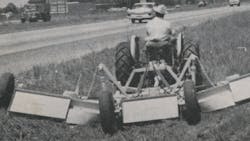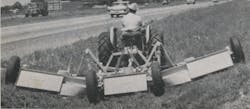Hydraulic cylinders actuate and position the end section of this 15-ft highway power mower, manufactured by Engler Mfg. Co., Houston. Engler was purchased
by Alamo Industrial in 1969. The mower was designed to follow the contour of the terrain without scalping ridges and high spots. It also enables the operator to raise either end section when the mower nears obstacles such as mailboxes, utility poles or concrete culverts.
Twin cylinders control an arched tongue arrangement. The end sections of the mower are hinged to the center section. Each wing is supported by a side wheel. This allows the wing to “float” and follow uneven terrain. Two hydraulic cylinders lift the end section to clear obstacles.
About the Author
Sign up for our eNewsletters
Get the latest news and updates

Leaders relevant to this article:

